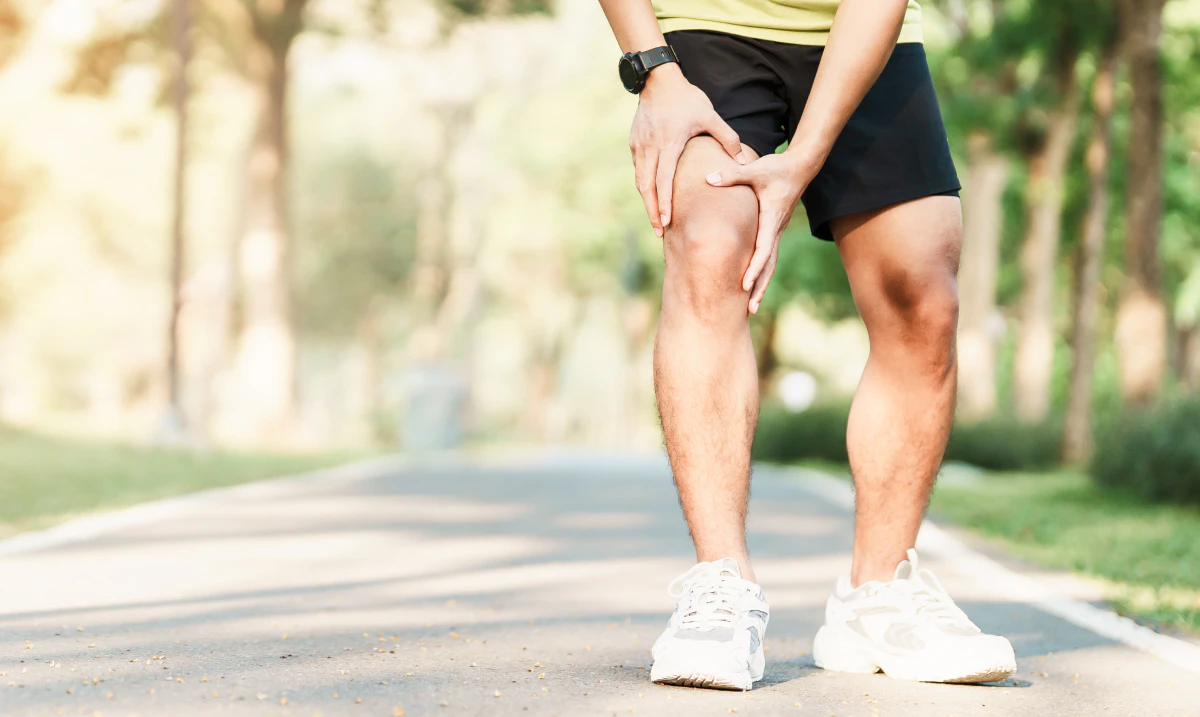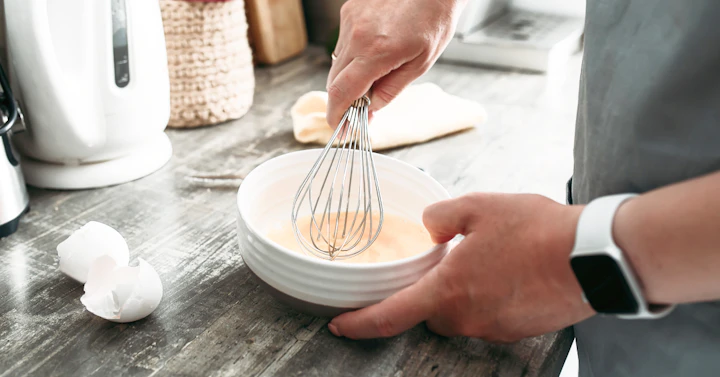Points of dietary attention to prevent tendinitis onset

Mélanie
Published on , updated on
share

10 min read
Summary
What worsens tendinitis?
Definition of tendinitis
What deficiencies cause tendinitis?
What foods should be avoided in case of tendinitis?
Alcohol and tobacco intoxication
The role of coffee in tendinitis
An unbalanced diet
On the contrary, what foods can I eat to strengthen my tendons?
A varied diet against recurring tendinitis
Omega-3 for tendon regeneration
Water to prevent tendinitis
Should I consider dietary supplements to prevent tendinitis?
Omega-3s
Collagen
Glycine
The myths around tendinitis: are there miracle or forbidden foods?
What is this myth about lemon juice and tendinitis?
Yogurts, lactose, dairy products: do they really trigger tendinitis?

Receive advice from our passionate coaches!
Let's talk about the haunting specter that constantly hangs over the minds of all runners: tendinitis, also known in the medical field as tendinopathy. It's a reality well known by many athletes, both amateurs and professionals. You might have already had the bitter experience of missing important competitions or crucial workouts due to recurrent tendinitis. This condition, often seen as merely an annoyance, can actually transform into a chronic and serious issue. It can affect not just athletic performance, but also the quality of everyday life.
Tendinitis, generally caused by excessive sport or poor running form, leads to pain, inflammation, and sometimes an inability to engage in the cherished activity. The athlete is then forced to take prolonged breaks in their training or even to reconsider their approach to running. Can dietary choices prevent the onset of tendinitis? If so, what foods should be prioritized? That's what we'll explore here.
What worsens tendinitis?
Definition of tendinitis
Tendinitis is a well-known reality for avid runners. But what is it exactly? In fact, it's the inflammation of the tendons, those essential cords that connect our muscles to bones, making every successful step during running possible. Problems may begin when our enthusiasm for physical activity becomes very - even too - intense. This enthusiasm can then transform into excessive sports practice, at least as far as your tendons' endurance is concerned. When they operate in overdrive, it can cause inflammatory reactions in our tendons, challenging them greatly. So, if you feel a little warning from your body, it might be time to take a break, heed those warning signals, and start caring for your tendons. As they say, better to prevent than to cure, especially when the goal is to prolong our passion for running!

What deficiencies cause tendinitis?
Let's delve into another essential aspect of prevention: nutrition. The foods we choose to consume play a crucial role in the health of our tendons. Good nutrition is not only about optimizing our performances, but it also contributes to preventing inflammations. Let's discover how a balanced and appropriate diet can be a valuable ally in the fight against tendinitis.
What foods should be avoided in case of tendinitis?
To protect our tendons and avoid any pitfalls, let's closely examine the foods we put on our plates every day.
Alcohol and tobacco intoxication
Some table/life companions can be formidable for our muscle and tendon well-being. Let's talk about excessive consumption of alcohol and/or tobacco. They do not pair well with our tendons (and our health!). Alcohol, besides altering our recovery capacities, promotes inflammation. While tobacco hinders blood circulation, thus slowing down healing.
Alcohol can impair recovery capacities in several ways. Firstly, it acts as a diuretic, leading to increased dehydration, which is unfavorable for muscle recovery. Dehydration can lead to decreased protein synthesis and increased muscle soreness. Alcohol interferes with sleep, disrupting natural cycles of rest and recovery. Altered sleep can lead to a decrease in the release of growth hormones, essential for muscle tissue repair.
Toxic substances in tobacco smoking, including nicotine, causeto tighten blood vessels, thus reducing the blood bit to tissues, including tendons. Moreover, tobacco damages the inner lining of blood vessels, promoting the formation of plaque primarily composed of lipids on the arterial wall. These plaques can further reduce the vessel diameter and impede blood flow, thereby compromising the circulatory system's ability to adequately supply nutrients and oxygen to tissues, including tendons. By reducing blood supply, tobacco creates a less favorable environment for tissue repair and inflammation management, increasing the risk of tendinitis and prolonging the healing process.
The role of coffee in tendinitis
The relationship between coffee consumption and tendinitis is an important question for runners. The foods we consume, especially those included in our breakfast, play a crucial role in maintaining the body's balance, and by extension, in preventing tendinitis. Coffee, often a central element of athletes' breakfasts, is particularly scrutinized to understand its influence on tendon health. Coffee, when consumed in excess, could have a pro-inflammatory effect harmful to proper tendon healing.
Generally, excessive coffee consumption is believed to begin beyond 400 milligrams of caffeine per day for a healthy adult. This roughly corresponds to four cups of filter coffee, though this amount can vary depending on the coffee's concentration and the size of the cups used. It's crucial to recognize that caffeine tolerance varies greatly from one individual to another, and some people may experience adverse effects with much lower doses. It's also important to account for other sources of caffeine present in the diet, such as tea, energy drinks, sodas, and certain medications.

An unbalanced diet
An unbalanced diet can be a threat when it comes to the health of your tendons. Deficiencies in essential nutrients such as vitamins, minerals, and antioxidants weaken our immune system, making our tendons more vulnerable. It's essential to understand that tendinitis does not stem from a single food, as its causes are multiple and often related to mechanical factors.
Now that we've explored the harms of certain dietary habits on our tendons, let's turn towards a positive and proactive approach to take care of them and continue running for many years without injury. Let's review the nutritional allies that strengthen our tendons and help prevent these dreaded tendinitis. By smartly adjusting our plate, we can not only improve our overall well-being but also give our tendons the nutrients they desperately need to stay strong and resilient during your Campus training plan!
On the contrary, what foods can I eat to strengthen my tendons?
A varied diet against recurring tendinitis
Yes, we're not reinventing the wheel here: a varied and balanced diet is the foundation for meeting your needs both in terms of proteins, lipids, and carbohydrates and in terms of vitamins and minerals. You can favor seasonal fruits and vegetables that will be more abundant in vitamins and minerals. And the more vitamins and minerals, the more likely you are to meet your antioxidants needs, hence preventing inflammation! In short, the choice of your foods is incredibly important if you want to avoid running-related injuries.
A balanced diet that meets your needs is a diet that doesn't worry you from dusk till dawn and dawn till dusk: you eat when you're hungry and stop when you're not. Finally, aim to have a source of protein (animal or plant-based), a source of lipids, and a source of carbohydrates at each meal, also known as cereal products. If you're looking for balanced breakfast ideas specific to running to start your sports day off the best way, we suggest discovering 8 recipes for the morning here.
NB: Whole grains have more complete nutritional contributions in terms of vitamins and minerals.
Omega-3 for tendon regeneration
This may be THE nutrient not to neglect to prevent tendinitis: Omega-3, they're simply indispensable. Let's get to know them!
Omega-3s are essential fatty acids that our bodies cannot produce on their own. It is therefore essential to obtain them through our diet. These fatty acids play a key role in reducing inflammation, thus promoting optimal recovery after effort. Moreover, they help maintain cell integrity, which is vital for strong and resilient tendons. Omega-3s can be true allies in preventing tendinitis. They're found in fatty fish (salmon, tuna, mackerel, sardine, herring...), in certain oils (canola, flaxseed) and oilseeds (walnuts, almonds, hazelnuts...).

Water to prevent tendinitis
The importance of hydration in managing tendinitis should not be underestimated. Water is essential for maintaining tissue health, including tendons. It facilitates the transport of nutrients necessary for healing to the affected area, promotes the elimination of free radicals (the body's small waste products) and helps maintain the elasticity of tendons.
Preventing dehydration allows you to avoid exacerbating inflammation and increasing discomfort. However, hydration does not replace appropriate medical treatment in the case of tendinitis. If you experience persistent pain, consult a healthcare professional for an accurate diagnosis and tailored advice.
In summary, maintaining good hydration (1.5 to 2 liters of water per day) can contribute to managing and preventing tendinitis. So, don't forget to stay well hydrated to continue enjoying running for many years!
Should I consider dietary supplements to prevent tendinitis?
Omega-3s
If eating fish regularly is not a habit in your diet, Omega-3 dietary supplements can be an interesting option to prevent tendinitis and support the general health of your tendons. Remember that dietary supplements should be considered a complement to a balanced diet, not a substitute.
You can opt for dietary supplements containing two essential fatty acids: EPA and DHA. Additionally, the presence of an antioxidant such as vitamin E in the supplement can be advantageous. Vitamin E helps limit the oxidation of fish oil present in the supplement, thus maintaining the quality of the Omega-3s.
NB: seek medical (or paramedical) advice before taking dietary supplements.

Collagen
Before considering collagen supplementation, it's important to remember that sufficient protein intake via your daily diet must be the priority. Collagen is considered an "essential" protein that makes up a large part of our connective tissues, including tendons, ligaments, skin, and bones. Moreover, we do not find collagen directly in our diet, except in meat broths or gelatin. They are considered sources of degraded collagen that can provide collagen precursors. Overall, the role of our daily diet regarding collagen is to provide certain amino acids that will contribute to its synthesis within our body.
Here's the checklist to follow if you choose to opt for this dietary supplement:
Select a form of hydrolyzed collagen peptides/fragments (avoid the native form, which is poorly assimilated).
The molecular weight should be between 2 000 to 5,000 DA (you can easily find this information on brand websites).
It should be of bovine or marine origin.
Ideal dosage for athletes = 5 to 10g per day to be consumed away from meals.
For people with a vegan diet, avoid vegan collagen as it's not very effective (because it's poorly assimilated). It's more interesting to turn to glycine.
NB: consult medical (or paramedical) advice before taking dietary supplements.
Glycine
Glycine is an amino acid synthesized by our body. Unfortunately, it is less present in our modern diet.
As a key component of collagen, this structural protein of tendons contributes to the formation and regeneration of tissues. While our body naturally produces glycine, supplements can be considered to reinforce this intake, especially if the increased needs from regular physical activity are not fully covered by the diet. This amino acid is primarily found in animal proteins (mainly lean meats), legumes (chickpeas, fava beans, white beans...), dairy products, and oilseeds.
NB: consult medical (or paramedical) advice before taking dietary supplements.
The myths around tendinitis: are there miracle or forbidden foods?
What is this myth about lemon juice and tendinitis?
There's sometimes a belief circulating that lemon juice has miraculous properties for treating tendinitis. However, it's essential to separate fact from fiction. While lemon is an excellent source of vitamin C, an antioxidant that promotes general health and can contribute to reducing inflammation, attributing the exclusive power to cure tendinitis to lemon juice is a bit exaggerated.
Vitamin C, present in lemon as in other fruits (citrus, berries...), plays a role in collagen synthesis, an essential protein for tendon health. However, it's important to note that vitamin C should be considered in the overall context of a balanced diet rather than as a sole solution against tendinitis.

Yogurts, lactose, dairy products: do they really trigger tendinitis?
The role of lactose and dairy products in triggering or exacerbating tendinitis is a subject of debate. Some individuals may experience symptoms of intolerance to lactose, including gastrointestinal problems, bloating, or discomforts after consuming dairy products.
Note: Lactose is present in cow's milk and also in goat's or sheep's milk.
However, directly attributing lactose or dairy products as the cause of tendinitis is too simplistic a conclusion. The relationship between dairy consumption and tendon issues is complex, and various individual factors must be considered to assess their real impact.
If you suspect lactose intolerance, it is advisable to consult a doctor for accurate diagnosis.
Completely removing dairy products from your diet due to fears of tendinitis could deprive your body of important nutrients. A balanced approach, taking into account individual nutritional needs, is essential for maintaining tendon health.
In conclusion, remember that your diet is a powerful tool against tendinitis. By wisely including foods rich in Omega-3, glycine, and vitamin C in a balanced plate, you naturally strengthen your tendons. If you are repeatedly affected by this condition, make sure to adopt adequate hydration and a balanced diet, avoiding excesses.
Although nutrition can play a significant role against the onset of tendinitis, it is crucial not to neglect other aspects of prevention and treatment of this condition, such as an appropriate training load, a balanced diet, and, if necessary, medical care.
To your plates, to your strides, for new running goals (without tendinitis 🙃)!

Mélanie
Published on , updated on
share




